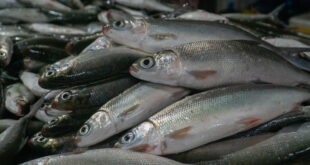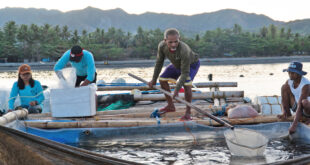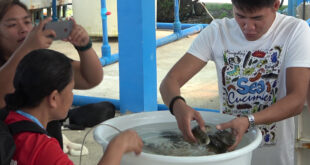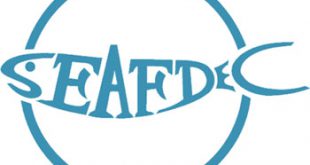International Training Course on Community-based Resource Enhancement in the Southeast Asian Coastal Region
Southeast Asian coastal marine areas are rich in aquatic life resources with highly diverse fauna and flora supported by a plenty of highly productive environments such as mangroves, seagrass beds, and coral-reefs, which serve as reproductive, nursery, and/or feeding grounds for many aquatic organisms. However, a lot of aquatic life resources are decreasing due to various causes.
Among the variety of aquatic species in the Southeast Asian region, there are a lot of high-value species and that is why fishing, hunting and collection have been done intensely. Because of this, most of the important fishery organisms are threatened and overexploited situation. Changing environment ascribed to global climate change and to degradation of aquatic life habitat through human activity also has unignorable impacts on the resource levels.
Thus, we are now facing the pressing issues to rehabilitate the fisheries resources of threatened and overexploited species to healthy levels under the changing environment, because they are invaluable not only for us but also for our offspring to secure their livelihood. We need to understand the fisheries productivity is closely linked with the ecosystems and environment including factors caused by human activity.
Replenishing depleted resources would be done through several strategies: regulating fishing effort, restoring degraded nursery and spawning habitats, seed production coupled with sustainable release programs and others. Among these, the refinement of release program, including hatchery and nursery technologies, is considered as one of the effective strategies for replenishing depleted resources.
The Southeast Asian Fisheries Development Center Aquaculture Department (SEAFDEC/AQD) has been conducting research activities aimed at the establishment/development of methodologies/technologies for seed production, sea ranching and release strategies for CITES-listed and/or overexploited species such as abalone, mud crab, sea cucumber, seahorse, Napoleon wrasse, etc. coupled with environmental conservation as a project under the Government of Japan Trust Fund (GOJ-TF) Program.
Since such aquatic resources should be continuously conserved and appropriately managed for the sustainable utilization, the established methodology/technology on important species as well as knowledge on essential concepts of resource enhancement need to be disseminated to fisheries managers, local governmental officers, NGO persons, and other stakeholders to build or develop capacities for community-based management and ensure the success of future stock or resource enhancement initiatives as well. These are potentially the key towards successful resource enhancement initiatives. These are potentially the key towards successful resource enhancement initiatives, especially in depleted or overfished fisheries in poverty-stricken communities in the Philippines and similar communities in Southeast Asia.
Objectives:
This training course implemented as an activity under the GOJ-TF program has objectives to disseminate to trainees:
1) essential knowledge on conservation of biodiversity and management of habitats including the complex ecological and socio-economic environments;
2) basic methodology and technology on seed production, release strategy and impact assessment in particular species, and;
3) positive thinking on how to integrate resource enhancement and environmental conservation, under the context of the changing environment induced by climate change and anthropological development using community-based strategies for successful implementation in harmony with nature.
Participants and Resource Persons:
Participants from SEAFDEC Member Countries, who are expected to be leaders, officers, and/or managers in coastal fisheries sector, will be invited as trainees and scientists/researchers of SEAFDEC/AQD and some other organization will attend as resource persons for this International Training Course on Community-based Resource Enhancement in the Southeast Asian Coastal Region.
To arrange the training, please contact:
Dr. Ma. Junemie Hazel Lebata-Ramos
SEAFDEC Aquaculture Department
Tigbauan 5021
Iloilo, Philippines
E-mail: jlebata@seafdec.org.ph
Tel: +63 33 330 7030
Fax: +63 33 330 7031
Website: http://www.seafdec.org.ph
 SEAFDEC/AQD Southeast Asian Fisheries Development Center | Aquaculture Department
SEAFDEC/AQD Southeast Asian Fisheries Development Center | Aquaculture Department



